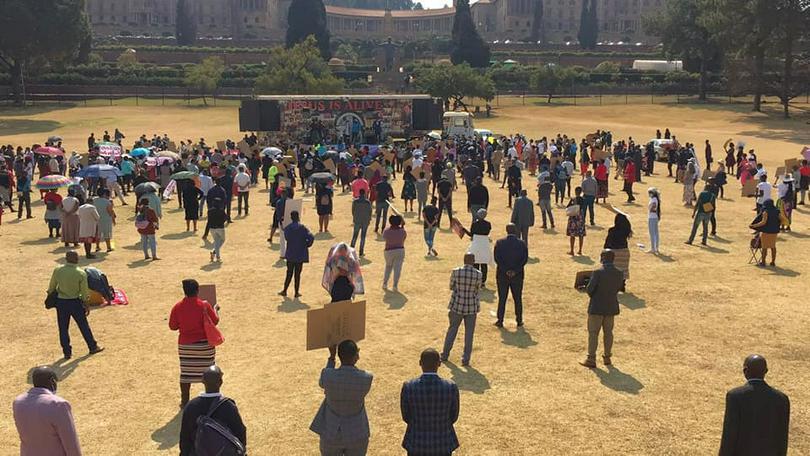A long-awaited case in which applications by several organisations challenging the government’s ban on religious gatherings in terms of Covid-19 regulations will be heard together by the Johannesburg High Court from Monday, November 22 until Wednesday, November 24.
The case before Judge Vally will be heard virtually from 10am to 3pm daily and proceedings will be live-streamed on the Freedom of Religion SA (FOR SA) and Solidarity Union Youtube channels.
The groups who will be challenging the government’s implementation of Covid lockdown regulations are FOR SA, the South African National Christian Forum (SANCF), Cornerstone Church (CC), Antioch Church (AC), Solidariteit Helpende Hand NPC (Solidarity) and the Muslim Lawyers Association.
And in a separate legal action, the SA Institute of Race Relations (SAIRR) has sent lawyer’s letters to President Cyril Ramaphosa and COGTA minister Nokosazana Zuma demanding to know on what basis the “state of disaster” has been extended at a time of record lows in Covid deaths. The SAIRR says in a statement that the extension is unconstitutional and arguably framed in a deceitful way.
In a media statement, the SANCF says the High Court case starting on Monday is extremely important, since it will have a long-term impact on the ability of the government to restrict and curtail the practice of religious freedoms in South Africa.
The SANCF, CC and ABC, represented by NLA Attorneys and Adv Samantha Martin, will argue that the lockdown has been and is a continuous encroachment on religious freedom and the ability of individuals to express their faith. They will argue that the serious encroachment by the government offends Christian conscience to worship their God and to practice their faith, says the statement.
Moreover, they will argue that it was never the intention of the legislature, in the drafting of the Disaster Management Act 53 of 2005, that the religious sector be shut down and restricted during a time of crisis. The statement says the state’s stance of shutting down the religious sector is irrational and unjustifiable, especially with places such as shopping malls and casinos, which pose no less risk of Covid infection, allowed to operate.
No ‘super-spreader’ evidence
The SANCF says the government, to date, has not been able to produce any evidence of Christian church gatherings being “super-spreader” events.
“The restriction of religious activities during the Covid pandemic has had serious socio-economic impacts for the poor and the vulnerable, and the Christian church, in particular, has been at the coalface of dealing with this fallout,” says the statement.
FOR SA says in a media release that it is asking the court to declare that the relevant regulations were both unconstitutional and unlawful. It says its case is supported by religious leaders and organisations representing 11 million people from a broad spectrum of the faith community.
“FOR SA is asking the Court to define in which circumstances, and to what extent, Government can restrict people from exercising their religious freedom rights guaranteed by section 15 of the Constitution”, said FOR SA executive director, Michael Swain. “This includes the right of people to gather together, in person, to collectively exercise their faith.”
He said: “While FOR SA recognises that the Constitution allows the government to limit fundamental freedoms, section 36 states that any limitation must be reasonable and justifiable. FOR SA, therefore, argues that the religious community was unfairly discriminated against, and their religious freedom rights were violated when the government enforced a total ban on religious gatherings while permitting other, similar gatherings to take place. Even in the midst of a pandemic, whatever measures government adopts to meet the crisis, must still be rooted in law and comply with the Constitution.
Noting that freedom to worship is central to the lives of millions of South Africans, he said: “No world should exist where you can sit side by side pulling the handle of a slot machine in a casino, but if you then put your hands together in prayer, you can be arrested and face criminal prosecution.”
The science and data
He added: “Government also cannot hide behind the mask of confidentiality to avoid accountability for its decisions and actions. The public is entitled to see the science and data upon which the minister relied when she decided that passengers in a crowded taxi were less likely to catch and spread the Covid virus than congregants sitting masked up, sanitised and socially distanced in a place of worship.”
He said no one is advocating for religious gatherings without proper hygiene, sanitisation, and social distancing protocols in place. However, FOR SA argues that government must either decide that all indoor gatherings are safe, or that no indoor gatherings are safe.
“Unless it can show the scientific data to support its position, it is irrational – and therefore unconstitutional and unlawful – for government to allow people to sit together in a restaurant (often unmasked), but to forbid them to sit masked up and socially distanced in a church pew,” said Swain.
FOR SA is also arguing that religious leaders must be formally recognised in the Regulations as “essential workers”.
“Despite the president’s acknowledgement in May last year that religious leaders are ‘essential frontline workers for purposes of spiritual counselling’, the lockdown regulations have still not been amended to reflect this obvious truth,” said Swain.
Originally from GateWay News
CCD reprinted with permission.












